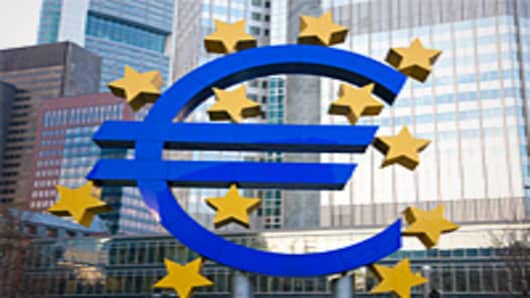Forget Prime Minister Lucas Papademos and all the Greek politicians-in-hiding: It's Draghi time. Attention will turn to the European Central Bank meeting tomorrow; traders last week were hopeful that a Greek deal would be completed by now, which would leave Mario Draghi more free to discuss the next step — how much the ECB might be willing to help Greece.
Without a Greek deal he is likely to be less forthcoming, but he will be pressed nonetheless.
The ECB bought billions of euros of Greek debt at a considerable discount (70 percent or so). Draghi is under pressure to return some of that money to Greece, either by selling the bonds back at current value, giving it the interest rate received, or by exchanging those bonds at the price it bought them for bonds in the European Financial Stability Facility (EFSF) , which can then return them to Greece for the discounted price the EFSF paid for them.
Is this financing governments, which the ECB is not allowed to do? You decide. Sure sounds like it to me.
Two other issues that bear watching at the ECB presser:
1) Interest rates. The ECB is expected to leave rates unchanged at 1 percent. Yet there's near-unanimity that the ECB is anticipating further economic deterioration and will begin cutting rates in March, ultimately ending at 0.5 percent for the main refinancing rate. Most also expect rates to stay low for some time.
2) Back up the truck: The second long-term repo operation (LTRO) on Feb. 29 is expected to have a take-up of about 400 billion euros ($530 billion) — versus 489 billion euros ($648 billion) for the previous three-year facility in December — but there is a substantial minority who are convinced there will be enormous demand and that the final figure will be closer to 1 trillion ($1.3 trillion).
The good news: Like his counterpart in the U.S., Draghi is flooding Europe with cheap euros, which appears to be successfully buying time for banks and even some countries. Italian 10-year yields are down to 5.6 percent, from 7 percent. Spanish 10-year yields are at 5.2 percent, down from about 6.7 percent. Even German and French yields are back down to 1 percent.
The bad news, of course, is that all the major central banks have dramatically expanded their balance sheets, and the countries themselves still have to solve the problem of too much debt and uncompetitive economies.
Elsewhere:
1) Why trading volumes are lousy, Part 2: I noted yesterday that banks have been consistently seeing poor trading volumes in their commentary, citing customers who were uncertain about the global macro environment.
The Wall Street Journal now gives even more reason to trade less: Goldman Sachs and Morgan Stanley said they would seek to personally recover losses from any employee who took too much risk. That includes the bosses, as well as the traders.
2) Caesars Entertainment priced 1.81 million shares at $9 a share to raise around $16.3 million. The gambling giant was originally slated to price Monday; however, it was delayed a day after the Securities and Exchange Comission asked for more disclosure about the company’s plan for additional stock sales by some investors.
3) Earning season continues...two companies raised their outlook:
Ralph Lauren climbs 7 percent pre-market after the retailer’s third quarter earnings per share beat analysts’ estimates by 11 cents, allowing it to raise full-year margin outlook. The clothing maker expects 2012 sales to increase 20 percent, versus a prior outlook of a rise in the high teens or low 20-percent range. Third-quarter same-store sales jumped 12 percent, but gross margin remained under pressure, falling to 57.1 percent of sales, due to inflation impacts that were only somewhat offset by higher prices. With pre-market gains of $169.50, Ralph Lauren is poised to open at an all-time high for the stock.
Wyndham Worldwide shares are nearly flat after the hotel franchiser and timeshare developer posted a lower fourth-quarter profit as it was hit by impairment charges. Wyndham raised its 2012 earnings per share outlook to $2.85 to $3 a share, excluding items, compared with a prior view of $2.72 to $2.82 a share. The company also upped its quarterly dividend by 53 percent to 23 cents a share.
Ingersoll-Rand shares drop 1.5 percent after it warned many of its markets were slowing and forecast 2012 profit and sales well below the Street’s estimates of $3.12 earnings per share and sales of $14.6 billion. Ingersoll-Rand's fourth-quarter earnings per share beat analysts’ expectations by 10 cents on a tax benefit and stronger margins, though revenue declined at most of the diversified manufacturer’s main businesses.
_____________________________
Bookmark CNBC Data Pages:
_____________________________
Want updates whenever a Trader Talk blog is filed? Follow me on Twitter: twitter.com/BobPisani.
Questions? Comments? tradertalk@cnbc.com



